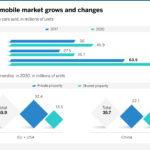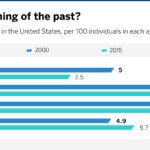Will your current car be the last one you own?
Car sharing and driverless cars are shaking the very foundations of the automobile industry. Will technology make car ownership obsolete?

The auto industry and the way urban society views mobility are changing at high speed. The reasons are many: environmental restrictions, the rise of electric cars, the first tests of driverless cars, and new business models based on the concept of Mobility as a Service (MaaS).
From the commercial point of view, there is one astounding change: in a short time, it may not make sense to own a car.
According to a report by the consultancy PwC on the future of the auto industry, in the markets of the European Union, China and the United States, some 63.5 million cars will be registered during 2017. In PwC’s future forecasts (for 2020, 2025 and 2030) that figure will rise, but with a marked difference: shared ownership will begin making inroads in the market in just three years, and its importance will skyrocket with the widespread use of driverless cars. The conclusion is that by 2030, in these three markets, 54.5 million cars will be registered as individual property, while those registered as shared property will total 27.1 million units. Together, the markets of the United States, the European Union and China will total 81.6 million new vehicles, an increase of 28.5% between 2017 and 2030.

With more options for mobility, the consumer is no longer interested in owning an asset that depreciates rapidly – it’s estimated that a car loses 18% of its value on the day it leaves the showroom – and that he/she doesn´t use most of the time. Technology, by facilitating shared mobility and developing driverless cars, is the main driver of this change, but there are also generational factors, as this graph shows:

So, does all this mean no one will want to own a car? How will we get around the cities that are home to 70% of the world´s population? And how will the auto industry adapt? The recent South Summit in Madrid, an international fair for entrepreneurs and technology investors, devoted several panels and colloquia to trying to answer these questions.
Amovens is one of the many startups whose business is developing shared mobility, which could account for 25% of all the miles driven in the United States by 2030, according to forecasts by the Boston Consulting Group.
The company´s founder, Mario Carranza, a native of Jerez, Spain, believes that “everyone needs a car, but no one should buy a car.” That’s the key to his business model, which is based on both car rental and on shared trips, along the lines of BlaBlaCar. And why should cars be shared? Apart from their rapid devaluation, because “it’s an asset that is only used 5% of the time, on average,” says Reno Marioni, one of the senior executives responsible for developing connected vehicles at BMW. Marioni had no hesitation in talking about “a radical change: we have to stop thinking just about the sales of cars and start paying attention to the services.”
However, it would probably be rash to write off the concept of car ownership. The U.S entrepreneur Scott Painter, who has founded several companies dedicated to the second-hand car market, was categorical: “Car ownership is not going to disappear.” He explained that s car is an asset with a strong emotional component, “linked to important milestones in life, like a first job, a child, a promotion or a move to another city. Who doesn´t remember their first car?” What is going to change, in Painter´s opinion, is the business model, which right now depends too much on financing and is complicated for the consumer.
“Throughout history only one mode of transport disappeared because of the arrival of another: the horse,” Painter said. “All the others survived and later adapted.” Now, it´s time for the automobile to evolve; car ownership will be just another chapter in the industry´s history.